HK’s music-makers were quick to adapt to the new normal of sharing performances online when COVID-19 arrived, ruling out a live audience. Also, staying indoors seems to have inspired a substantial body of new work, writes Rob Garratt in the second installment of a series on art in the time of a pandemic.
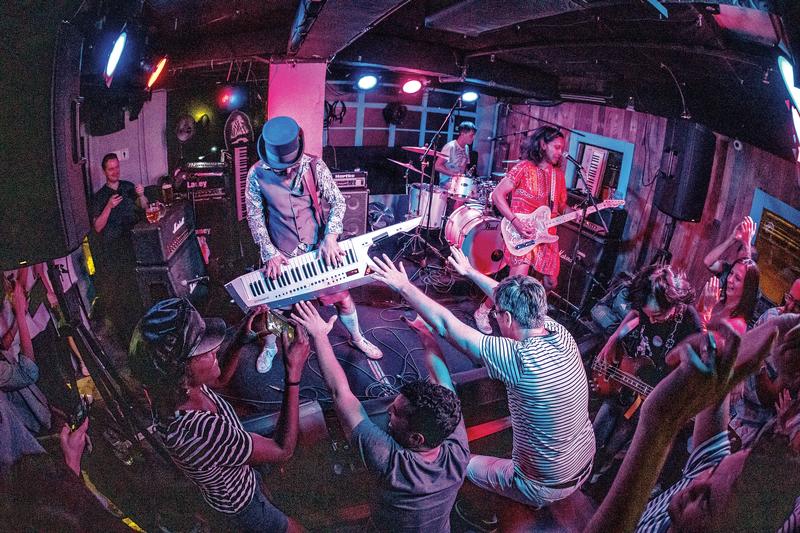 Central’s The Aftermath Bar before social distancing became the new normal. (HONGKONG-ROCKS.COM / FOR CHINA DAILY)
Central’s The Aftermath Bar before social distancing became the new normal. (HONGKONG-ROCKS.COM / FOR CHINA DAILY)
Like more industries than it is wise or possible to count, over the past three months Hong Kong’s live music scene ground to a spluttering halt, as venues shuttered and social distancing became our sad but sensible new normal. The longer-term outcome for those powering the city’s nightlife and entertainment infrastructure — not just performers but the managers, promoters, sound technicians and everyone else who supports and depends on gigs and those who go to them — won’t be clear for months.
But rather than wallowing in woe, this unprecedentedly bleak moment in human history also inspired many passionate, industrious individuals to step up the game and bring the scene online — whether by hosting livestreamed concerts directly into audiences’ homes or digging deep to curate social distancing-friendly content.
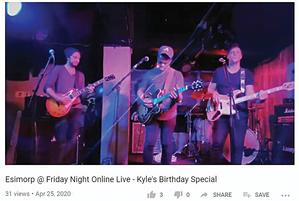 Hong Kong indie rock band Esimorp’s show was streamed on The Aftermath Bar’s online platform. (PHOTO PROVIDED TO CHINA DAILY)
Hong Kong indie rock band Esimorp’s show was streamed on The Aftermath Bar’s online platform. (PHOTO PROVIDED TO CHINA DAILY)
Long before The Rolling Stones, Lady Gaga, Billie Eilish, Taylor Swift, et al assembled virtually for “One World: Together At Home” — the April 19 fundraiser which raised more than US$120 million for the World Health Organization — Hong Kong had adapted to online-only entertainment.
Since mid-February, members of Hong Kong Philharmonic Orchestra have been sharing heartfelt solo performance videos recorded in their own homes, reaching tens of thousands of viewers across Facebook, Instagram, Twitter, YouTube, WeChat and Weibo, as part of the “Phil Your Life With Music” series.
“Music is a source of courage, healing, calm and unity,” said chief executive Benedikt Fohr. “It is our mission to share our passion with people everywhere, not just in designated venues but in other accessible ways. I hope our videos will brighten your life and keep us connected, until we meet again.”
Hong Kong Sinfonietta later launched a similar concept, showcasing YouTube submissions from its members stuck at home, under the title “Staying close to our Artists.”
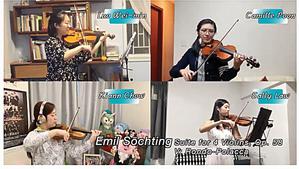 A Hong Kong Sinfonietta virtual concert, in which each member of a violin quartet joins in from home. (PHOTO PROVIDED TO CHINA DAILY)
A Hong Kong Sinfonietta virtual concert, in which each member of a violin quartet joins in from home. (PHOTO PROVIDED TO CHINA DAILY)
The indie music scene has proved equally enterprising, with local singer-songwriters Olivier Cong, Marstn, Tomii Chan and William Elvin being just a few of the artists who have taken to Instagram Live and Facebook Live to host DIY streamed concerts. And it’s not just music — comedy troupe TBC Improv HK have hosted several live-streamed laugh-fests, flitting between seven members in seven locations simultaneously, while Peel Street Poetry has moved its weekly open mic online.
“If there’s one good thing to come out of this, it’s getting artists to really up our streaming game,” posted Glen Lloyd, the AV artist otherwise known as Junk!, following his first home-streamed concert outing on March 28.
Proof that digital concerts were the new norm came when online community The Underground Hong Kong turned its regular gig listing mailouts into a schedule of locally-broadcast livestreams.
 Hong Kong Philharmonic Orchestra’s “Phil Your Life With Music” series of virtual concerts have reached tens of thousands of viewers through social media. (PHOTO PROVIDED TO CHINA DAILY)
Hong Kong Philharmonic Orchestra’s “Phil Your Life With Music” series of virtual concerts have reached tens of thousands of viewers through social media. (PHOTO PROVIDED TO CHINA DAILY)
Levelling the curve
Such enterprising online activity spiraled as a direct antidote to an ever-longer slump in live shows. Large-scale concerts and gatherings began to be canceled or scaled back in Hong Kong as early as January end, disappointment cresting early February with the cancellation of the entire 100-plus show Hong Kong Arts Festival, while mourning mounted in March as international visits from Korean indie upstarts Hyukoh and US rock icons Green Day, Marilyn Manson, Pixies and Black Flag were all axed.
For local professional performers, many who depend on the spotlight for their livelihood, the coffin was finally nailed shut in early April, when all nightlife venues were finally, and sensibly, ordered to close.
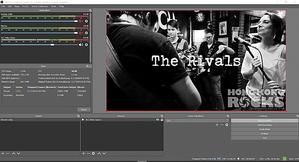 With music venues closed, live music photography and video streaming platform Hong Kong Rocks! set up a 24-hour streaming service. (HONGKONG-ROCKS.COM / FOR CHINA DAILY)
With music venues closed, live music photography and video streaming platform Hong Kong Rocks! set up a 24-hour streaming service. (HONGKONG-ROCKS.COM / FOR CHINA DAILY)
Having made the decision some weeks earlier, the promoters behind Central’s vibrant music and art hub The Aftermath Bar, took inspiration from venues in the US and Europe and decided to take the music online. Presenting full, evening-long multi-act bills from their stage, with pro sound and shot on multiple cameras, they offered a welcome improvement on individual artist’s DIY, smartphone-shot bedroom efforts.
“We decided the best thing to do is whatever we can to stay relevant,” said co-founder Alicia Beale, adding that all the acts and tech staff volunteered to work pro bono. “It’s been a cool creative experience to figure out how to do it, everyone really connected in the scene — let’s just keep trying to do cool, interesting, creative things. And it looks good.”
Meanwhile, after weeks of canceled gigs and inactivity, TY Productions’ Jazz Dialogues series moved online — charging viewers HK$50 for an exclusive link to the stream — while existing virtual programs including Wow and Flutter’s weekly Live@Home series and Hong Kong Arts Centre’s House Music Series have seen a sharp spike in activity and interest.
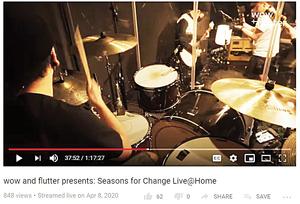 Hong Kong indie music band Wow and Flutter streams a show as part of their “Live@Home” series. (PHOTO PROVIDED TO CHINA DAILY)
Hong Kong indie music band Wow and Flutter streams a show as part of their “Live@Home” series. (PHOTO PROVIDED TO CHINA DAILY)
More than music
Increasingly, this second wave of online activity has been driven not just by musicians, but by the apparatus that support and enable them. Promoters of The Week Hong Kong started a series highlighting a different song by a local indie act every day, entitled #SocialDistancingSounds, while video platform Hong Kong Rocks began a 24-hour non-stop radio-like YouTube stream, picking at random from the group’s archive of more than 900 videos.
“Since live events stopped, we wanted to give the fans of Hong Kong’s live music scene all over the world a chance to drop in anytime,” explains founder Oliver Spiesshofer. “This has brought in people from all over the world, with about 50 people dropping in every day.”
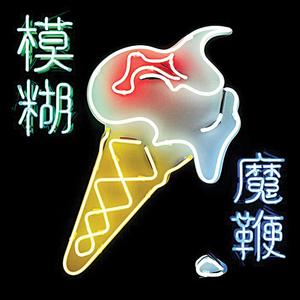 Britpop group Blur’s much-loved album, The Magic Whip, was created when they got stranded in Hong Kong a few years ago. (PHOTO PROVIDED TO CHINA DAILY)
Britpop group Blur’s much-loved album, The Magic Whip, was created when they got stranded in Hong Kong a few years ago. (PHOTO PROVIDED TO CHINA DAILY)
With little chance to exercise the in-person distribution model it relies on, music fanzine Press : Release has held out a new issue and instead taken to social media to highlight eclectic selections and livestreams.
“There’s been a big hole in everyone’s lives, and we don’t know when it will be filled,” says co-founder and publisher Nick Langford. “There’s no upside at all, no benefit to musicians not being in front of people for a live performance — just try and imagine your favorite artist playing not to a live audience, but a smartphone screen? It’s tragic.”
However, people staying indoors has been good for Langford’s second-hand record business, Vintage Vinyl HK — clocking a 50 percent increase in sales compared with the same period last year.
“People are online, scouting around, looking for something,” he adds. “Right now, people need a distraction.”
 The Aftermath Bar in pre COVID-19 days. The music and art hub presented professionally-shot videos of their most recent performances online. (HONGKONG-ROCKS.COM / FOR CHINA DAILY)
The Aftermath Bar in pre COVID-19 days. The music and art hub presented professionally-shot videos of their most recent performances online. (HONGKONG-ROCKS.COM / FOR CHINA DAILY)
Blurred lines
Amid the pandemic, few noted that April 28 marked the fifth anniversary of The Magic Whip — arguably one of the most high-profile musical works of art conceived and created in Hong Kong. The album was created by a visiting Western act, Britpop icons Blur, who authored their first album of new material in 12 years, and likely swansong, during an unplanned stay in the city.
The circumstances of The Magic Whip might offer some solace to today’s musicians holed up in lockdown. Icons of an earlier era, the heady 90s, Blur had no apparent intention of creating new work when they broke a lengthy hiatus to play a series of lucrative reunion shows in 2009, nor again in 2012 and 2013 — the latter of which included a May gig at Hong Kong’s AsiaWorld-Expo.
When their next engagement, at Japan’s Tokyo Rocks Music festival, was canceled, the quartet found themselves with five days to kill in “Asia’s World City”. Rather than mount The Peak or ride the Ngong Ping 360 cable car, the quartet booked sessions at Kowloon’s Avon Recording Studios, laying down the basic tracks for 15 new songs.
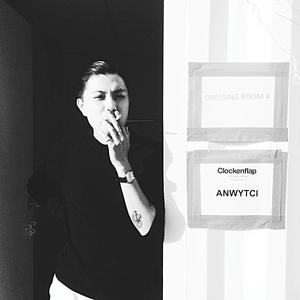 Imagine Imagine Imagine Records founder Yuman Ng remembers the excitement of finding Hong Kong references in Blur’s The Magic Whip. (PHOTO PROVIDED TO CHINA DAILY)
Imagine Imagine Imagine Records founder Yuman Ng remembers the excitement of finding Hong Kong references in Blur’s The Magic Whip. (PHOTO PROVIDED TO CHINA DAILY)
Chris B, founder of long-running music platform The Underground, remembers spotting the Britpop icons riding the MTR one morning. “It didn’t seem weird to me — it was the quickest way to get from Central to Jordan,” she laughs. “The person I was travelling with couldn’t believe they wouldn’t take a taxi — they said ‘it’s just some middle-aged white guys’. But it was Blur!”
Following further sessions in London and another fact-finding mission to Hong Kong, the 12-track The Magic Whip (named after a Chinese firework) finally emerged nearly two years later to glowing reviews, an unmitigated surprise from an act no one expected to hear from again. But there was more than nostalgia at stake; reconciling the pop hookiness which made them famous with the artsy introspection of the band’s latter records.
Throughout, frontman Damon Albarn makes repeated, endearing local references, singing of “the slow boat to Lantau through misty seas” on Ong Ong, and “Eight o’clock Kowloon emptiness” on Ghost Ship, while Thought I Was a Spaceman invokes “The fight for Happy Valley”, and Mirrorball evokes “Ocean Park where the seagulls cry” and riding “a Jordan train”.
“I just felt ‘wow’ — and then, OK nice, thanks,” remembers Yuman Ng, manager of Hong Kong-based Britpop revivalists Black Coffee and founder of local indie label Imagine Imagine Imagine Records.
 Hong Kong singer-songwriter William Elvin appears in a DIY streamed concert. (PHOTO PROVIDED TO CHINA DAILY)
Hong Kong singer-songwriter William Elvin appears in a DIY streamed concert. (PHOTO PROVIDED TO CHINA DAILY)
Inspiration, information
That such a short, inconsequential period of empty time could birth such a satisfying surprise is a stunning example of the mystical mechanics of artistic inspiration, but also offers some solace to homegrown musicians, stuck at home and self-isolating, might draw from during this unique and frightening moment in music history.
Chris B directly contacted more than 100 Hong Kong bands to see how they are using the spell spent mostly at home and apart, and was surprised to find upbeat replies from more than half, the majority of which were taking time out to work on new material — often fueled by video conferencing software unimaginable to earlier generations.
While many rehearsal studios have been closed and musicians may choose to self-isolate, apps like Zoom can now accommodate multiple players jamming in real time, without the stutters and delays that plagued us just a few years ago.
“It’s interesting the way a lot of musicians are taking this as a chance to create, a sense of making the most of it,” adds Chris B, whose own band is currently self-isolating. “There is a challenge for bands to get together, you do worry about where your bandmates have been.”
“Around half were very enthusiastic, saying it was an important time to take out and write and record — some at a distance, others in their own spaces.”
By compiling a regular update of what bands have achieved with this time, Chris B hopes to inspire more artists to seize the singular opportunity of this unprecedented tragedy.
And it’s certain that, much as Hong Kong’s unique urban environment shaped The Magic Whip, music being made right now will reckon directly with the terrors of COVID-19.
“A musician writes about their experiences and things they feel strongly about,” she adds. “Whatever else happens, in eight to ten months there’s going to be a bunch of babies — and a lot of new music.”



